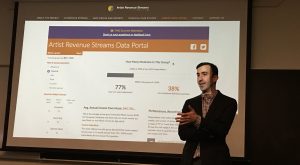By Ben Levine

Northwestern University professor of law Peter DiCola joined the MSLCE cohort for a conversation surrounding a question often asked in the creative fields: how the heck do musicians make money? Professor DiCola is one of the first people to do extensive research on the subject and took the opportunity to address questions that the students had posed in response to his research paper, “Money from Music.” While the data on this field is still developing, it is clear that the revenue streams for musicians are undergoing dramatic change and that the future of monetizing music is not selling recordings.
“I don’t think it’s about copyright law. I don’t think that the ways musicians make money are going to have anything to do with copyright law.” Professor DiCola made it clear that copyrighted material doesn’t function like a standard wage as some policy makers may think. “Even if you doubled [copyright payments] for a lot of these musicians, it just wouldn’t make a huge difference in their overall income.” The devaluation of copyright has hit the industry harshly, but changing business models in music may end up being blueprints for the rest of the creative fields.
This loss of revenue leads musicians to double down on other aspects of their industry like live performance and licensing. These are more concrete ways to generate income and the percentage of income from sources outside of copyright is growing. Professor DiCola suggested in the discussion that although the actual revenue from recorded music is in decline, it may make sense to start thinking about the value of recordings in terms of the attention an artist receives and how that translates into new opportunities. The MSLCE program focuses on the idea of the “marketplace of attention” and as people’s willingness to pay for recorded music recedes, the music industry becomes a prime example of seeing how this concept plays out in the modern landscape.
Professor DiCola offered a fascinating glimpse into the ways new distribution methods are affecting the creative work. His discussion was relevant to musicians and non-musicians alike because the rise of digital content affects all of the creative industries. As the MSCLE cohort moves towards graduation, data like this will prove invaluable to understanding the ways our industries are adapting to the modern world. You can find and interact with professor DiCola’s research at Future of Music.